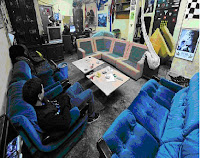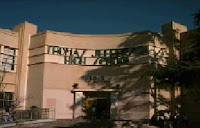A local is a place were young people can meet. A group of friends rent a commercial space such as a garage or a shop and they can decorate it as they want. You rent that place and you can do whatever you want there. We usually have sofas, TVs, Play Station, computers, fridges, microwaves… It is like a second house for us. There you can smoke or drink or have parties, but usually here people have problems with neighbours because of the noise.
 Here we also have “Gaztetxe” that means house of young people, and the
difference between that and the local is that in the Gaztetxe can enter anybody
and also the house is occupied, so nobody pays every month. We usually make
concerts and big parties in Gaztetxes because they used to be separated from
other houses, so there are not neighbours.
Here we also have “Gaztetxe” that means house of young people, and the
difference between that and the local is that in the Gaztetxe can enter anybody
and also the house is occupied, so nobody pays every month. We usually make
concerts and big parties in Gaztetxes because they used to be separated from
other houses, so there are not neighbours.

No comments:
Post a Comment